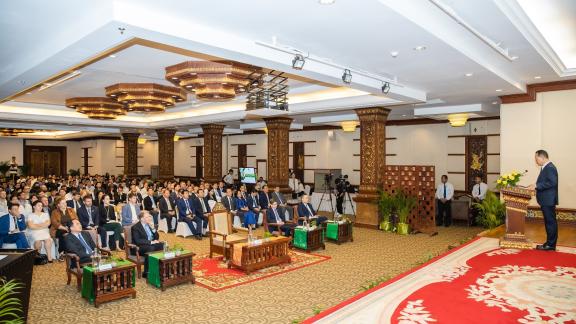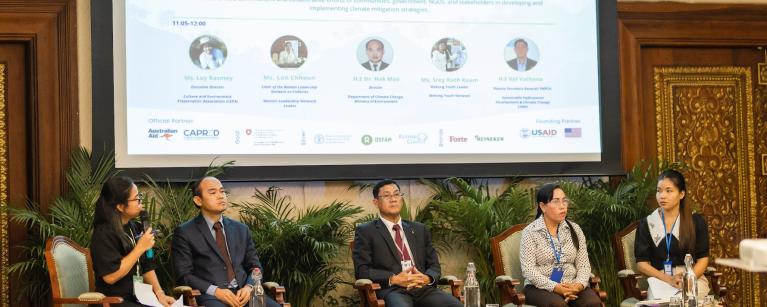Strengthening Community Resilience: Collaborative Action on Climate Change in Mekong and Tonle Sap.
Oxfam organized a panel discussion during the Cambodia’s Climate Change Summit in early November 2023, focusing on “Community Perspective and Government Commitment to Address Climate Change in the Mekong and Tonle Sap.” The event served as a platform for community women representatives from the Mekong and Tonle Sap regions to share their first-hand experiences of climate change impacts and call for decisive government action to enhance community resilience.
The session provided an opportunity for government representatives to highlight their commitment to tackling climate change, as evidenced by Cambodia’s Nationally Determined Contributions (NDC) 2020. In this landmark document, Cambodia pledges to reduce greenhouse gas emissions by up to 27% by 2030 compared to business-as-usual scenarios. This ambitious target reflects the country’s vulnerability to climate change and the urgent need for action.
Recognizing the importance of effective financial planning, the Cambodian government launched the Cambodia Climate Change Finance Framework in 2020. This framework serves as a blueprint for allocating climate finance resources effectively. Additionally, the government is currently formulating a climate change investment plan to identify and prioritize specific opportunities, while actively seeking international assistance to achieve its climate objectives.
Ms. Ream Srey Rath, a youth leader from the Mekong region, vividly illustrated the significant impacts of climate change on communities along the Mekong River. She highlighted the altered water flow patterns, diminishing fishery resources, extended dry seasons, and delayed wet seasons that have profoundly affected the river’s ecosystem and local livelihoods. The consequences of these changes have been far-reaching and call for urgent action.
Ms. Chhuon Lann, a prominent women leader from Tonle Sap, drew attention to the impact of climate change on the water levels of both the Mekong and Tonle Sap. She emphasized the adverse effects on fishery production and the delicate ecosystems within the lake. The disruption of water levels has upset the natural balance of Tonle Sap, posing challenges to the sustainability of fish populations and the overall well-being of the lake’s ecosystems.
In her concluding remarks, Ms. Chhuon Lann acknowledged the commendable commitment of the government in addressing climate change. The country has taken significant steps to reduce emissions and enhance resilience to climate change impacts. However, she stressed the need for intensified efforts and scaled-up initiatives. She urged the government to mobilize international support and prioritize the promotion of more inclusive water governance in the Mekong and Tonle Sap regions. Strengthening community resilience against climate vulnerability should be a top priority, ensuring that no one is left behind in the face of this global challenge.
The panel discussion served as a powerful reminder that collaborative action between communities and government is essential to effectively address climate change. By heeding the voices of those directly affected and implementing inclusive and sustainable strategies, Cambodia can pave the way for a resilient and sustainable future in the Mekong and Tonle Sap regions.

H.E. Eang Sophalleth, Minister of the Ministry of Environment, during his remarks at Cambodia Climate Change Summit 2023. ©MFI
